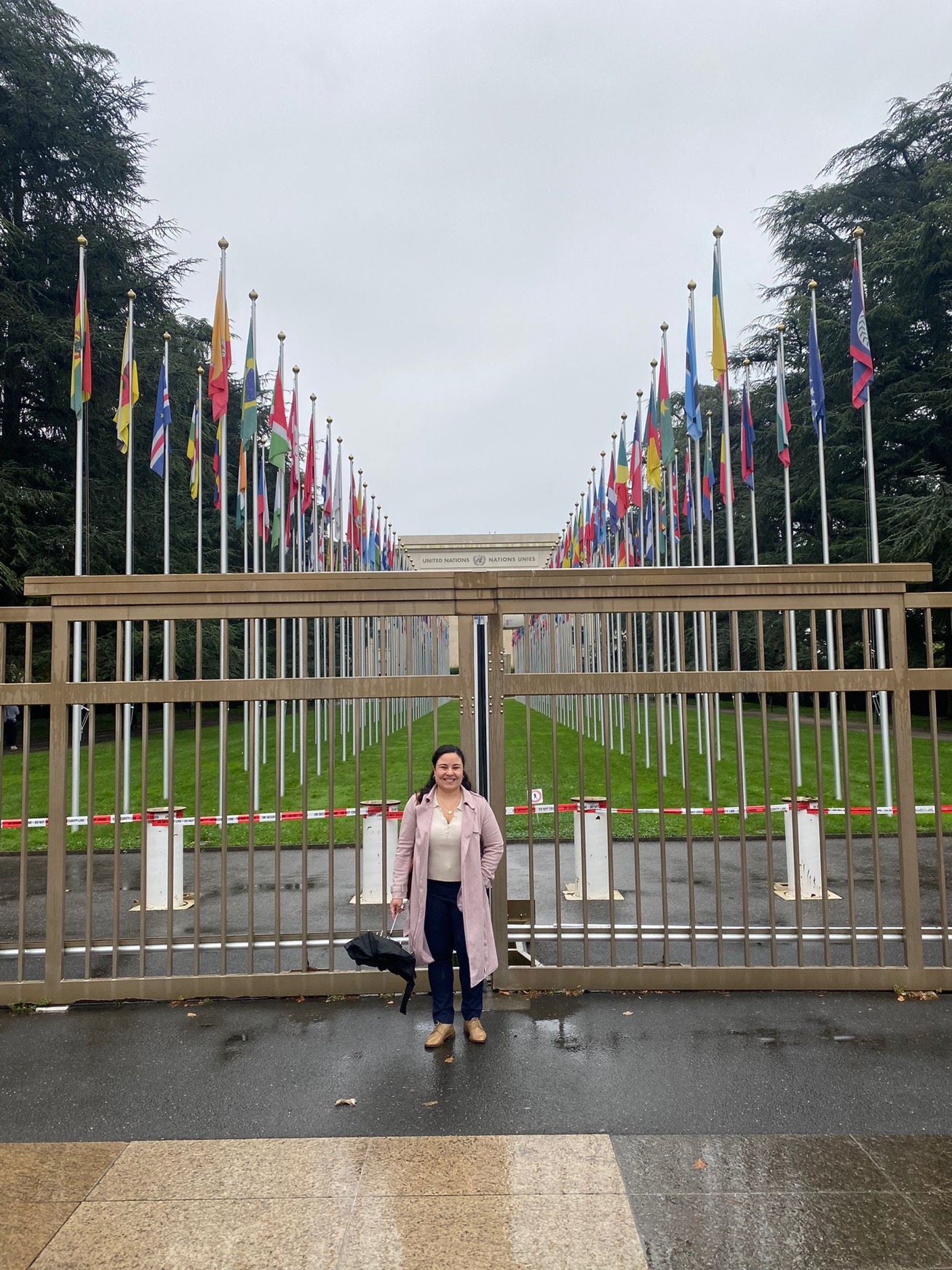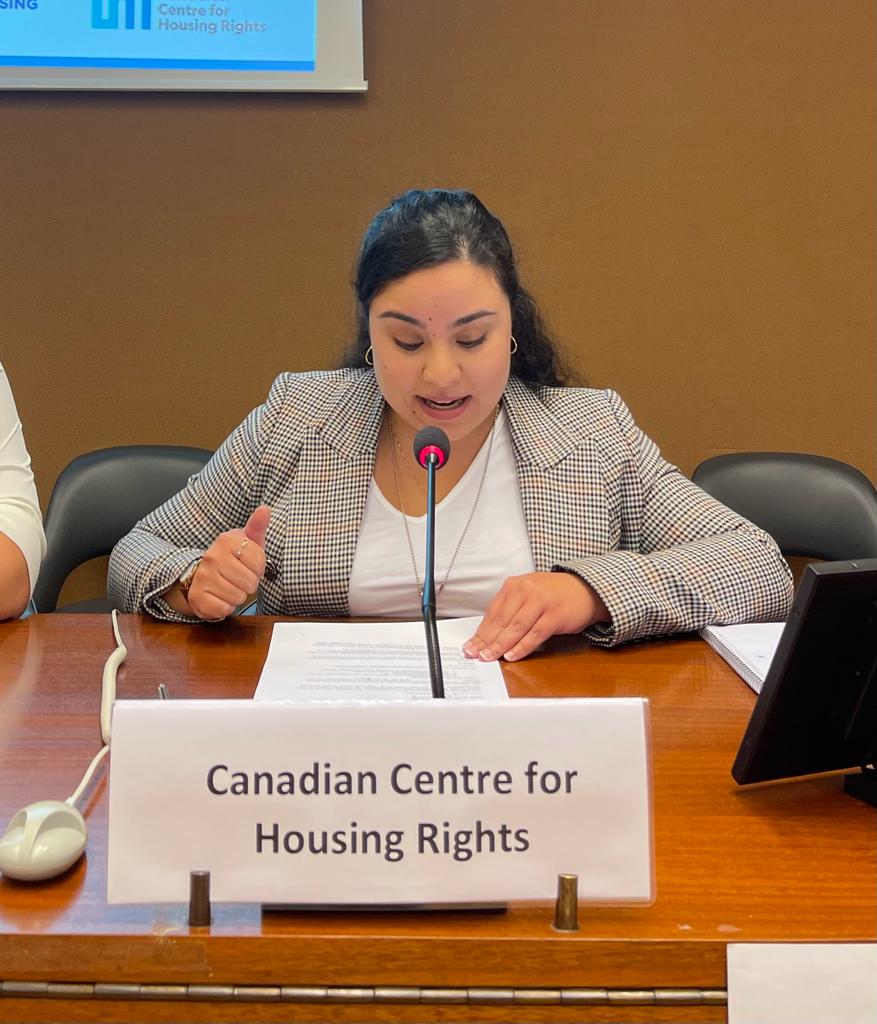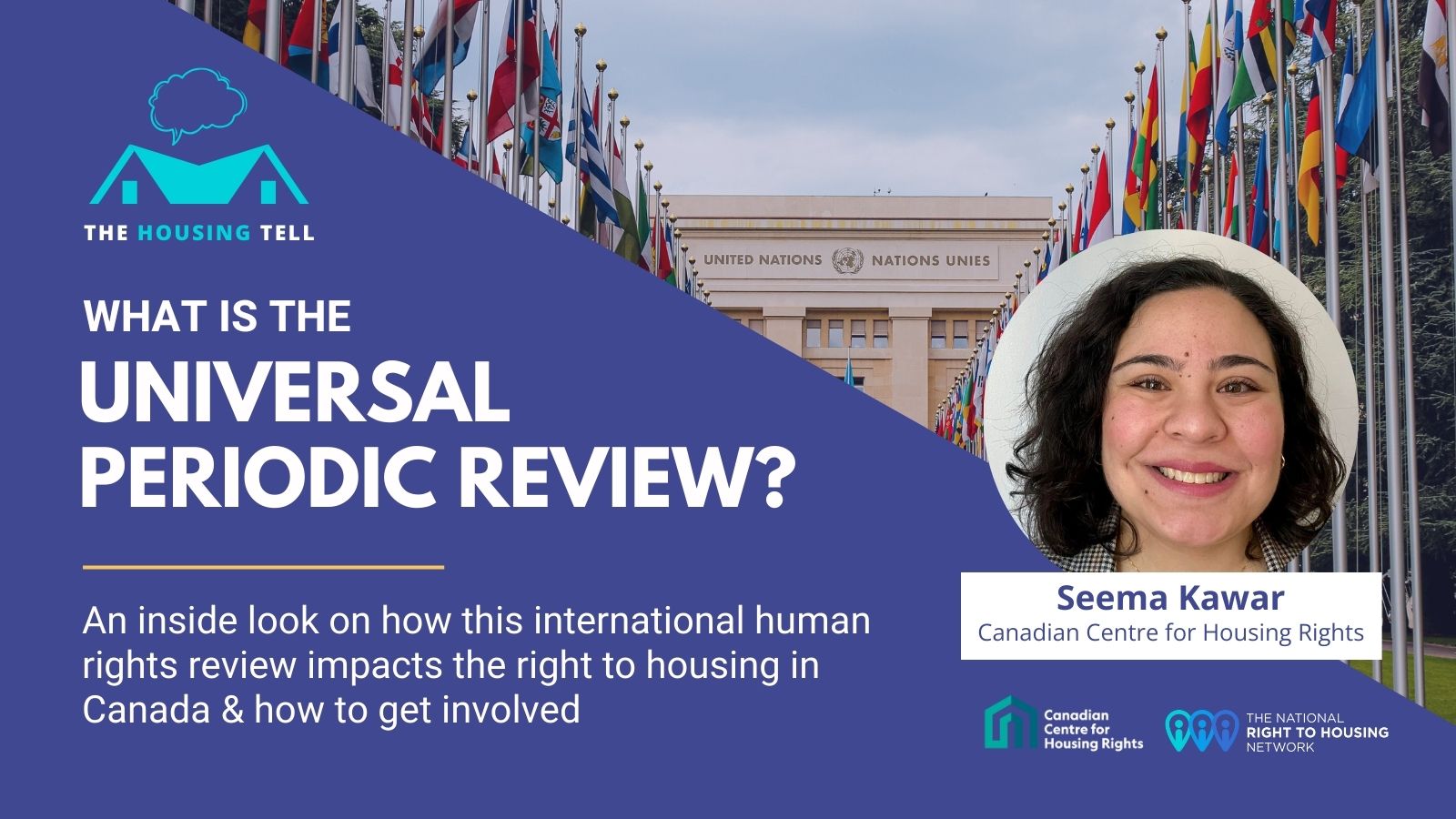 The Universal Periodic Review (UPR) is a unique process in which the human rights records of United Nations (UN) member states get reviewed every 5 years.
The Universal Periodic Review (UPR) is a unique process in which the human rights records of United Nations (UN) member states get reviewed every 5 years.
This review was established by the United Nations Human Rights Council and puts countries like Canada under the spotlight so that other UN member states can ask questions, analyze how well we are doing on our domestic and international human rights obligations, and make recommendations on how we can improve our implementation of human rights.
Canada had its fourth Universal Periodic Review on November 10, 2023.
In the latest of our Housing Tell series, this Q&A-style blog will give you an inside look at how the UPR process works and how advocates can engage with it to influence right to housing policy and legislative changes in Canada, based on Seema Kawar’s personal experience with the process.
Seema Kawar is a Senior Legal and Policy Advisor at the Canadian Centre for Housing Rights (CCHR). Before joining CCHR, Seema worked as a lawyer in the areas of housing law, social assistance, and immigration and refugee law in Toronto. She also has a background in international law and has worked on human rights issues in Jordan, the United Kingdom, Switzerland, and Canada.
Advocating for the Right to Housing in Geneva
In preparation for Canada’s 4th Universal Periodic Review (UPR), the Canadian Centre for Housing Rights (CCHR) and National Right to Housing Network made a joint submission to the UPR in April of 2023 on the topic of inadequate housing and homelessness in Canada.
Following the joint submission, Seema Kawar from CCHR went to Geneva to participate in the UPR pre-session in August to engage directly with state representatives to make sure they were aware of the ongoing inadequate housing and homelessness crisis in Canada, as well as highlight the human rights tools that are available to the Canadian government to better guide the member states’ questions and recommendations during the review.
Ultimately, Canada received 122 recommendations from UN member states. The National Housing Strategy Act was directly referenced four times, and the theme of ensuring adequate housing and ending homelessness echoed throughout the review.
These UPR recommendations are meaningful for the right to housing movement in Canada because they offer an opportunity to apply pressure on the Canadian government to live up to—and fully implement—its human rights obligations to fully realize the right to adequate housing for all.
Question #1: Canada was up for review under the UPR this year (along with 13 other countries). Can you explain a little bit more about what this process looks like and what this means for Canada?
At the start of the process, each country under review submits a report describing the actions they took to improve their human rights situation and to overcome human rights challenges since their last review.
Then, just like with all UPRs, the review itself takes place through an interactive discussion between the representatives of the country being reviewed (in this case Canada) and those of other countries. During this discussion, any country can ask questions, make comments, and make recommendations to Canada. Canada then has a chance to respond and can either accept or not accept the recommendations made. By accepting recommendations, Canada commits to implementing them and in the next review it will be asked to report on its progress in doing so.
Question #2: How is the UPR different from other international reviews?
The UPR is different than other treaty body mechanisms at the United Nations in a number of ways.
Firstly, instead of focusing on a particular area of human rights such as women’s rights or the rights of children, it covers all human rights. Secondly, instead of being reviewed by a panel of human rights experts, countries review each other and provide each other with recommendations on how they can improve their implementation of human rights.
The UPR is the only mechanism of this kind as it is based on the equal treatment of all countries and gives countries the chance to share their human rights best practices with one another.
In this vein, stakeholders from the country under review, such as civil society organizations and national human rights institutions (i.e. human rights commissions), can engage in the review process by submitting their own written reports that a) discuss their country’s progress in implementing recommendations from the last review and b) suggest recommendations that should be made during the review process.
These stakeholders can also engage with diplomats from different countries to share their written reports and recommendations, which is what I did during the UPR pre-session in Geneva in August 2023.
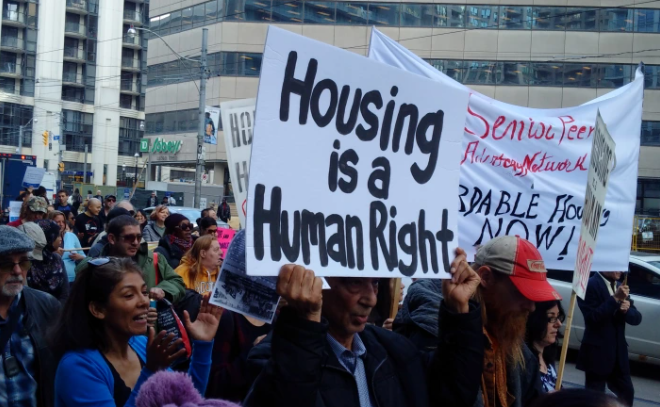 Question #3: In your opinion, why is the UPR relevant to the right to housing movement in Canada?
Question #3: In your opinion, why is the UPR relevant to the right to housing movement in Canada?
I think that the UPR had a positive impact on the right to housing movement in previous years where Canada was under review, and it is still relevant now.
In its last three reviews, for example, 21 recommendations were made to Canada on the right to housing including: Implementing a national housing strategy to address the housing crisis, adopting legislation that recognizes the right to housing, taking measures to reduce homelessness and poverty, and implementing strategies to address housing inadequacy for Indigenous Peoples.
I believe that these recommendations put pressure on the Canadian government to implement the right to housing which supported the advocacy done by the right to housing movement in Canada, resulting in the passage of the National Housing Strategy Act (NHSA) in 2019—Canada’s first human rights-based legislation recognizing housing as a “fundamental human right.”
However, despite passing the NHSA, the work of the right to housing movement in Canada is still necessary to make sure that all levels of government within Canada actually comply with the commitments under this legislation.
Question #4: Where and how does civil society fit into the UPR process?
The UPR continues to be an opportunity for civil society organizations, like CCHR and the NRHN, to provide feedback on Canada’s progress in implementing the right to adequate housing, to explain why the steps taken so far are not enough, and what more should be done.
In Canada’s review this year, we have made it clear to other countries that although Canada recognized the right to adequate housing in the 2019 National Housing Strategy Act (NHSA) since its last review, Canada has failed to properly comply with its new commitments. For example, it did not revise the 2017 National Housing Strategy—Canada’s core housing policy program—to make sure that it complies with the right to housing, and to make sure the housing created under the Strategy is accessible and affordable to the households most in need.
Canada continues to face a housing affordability and homelessness crisis, with no clear goals and timelines set for eliminating homelessness, which goes against Canada’s human rights obligations. It also continues to underinvest in social housing and Indigenous housing among other issues.
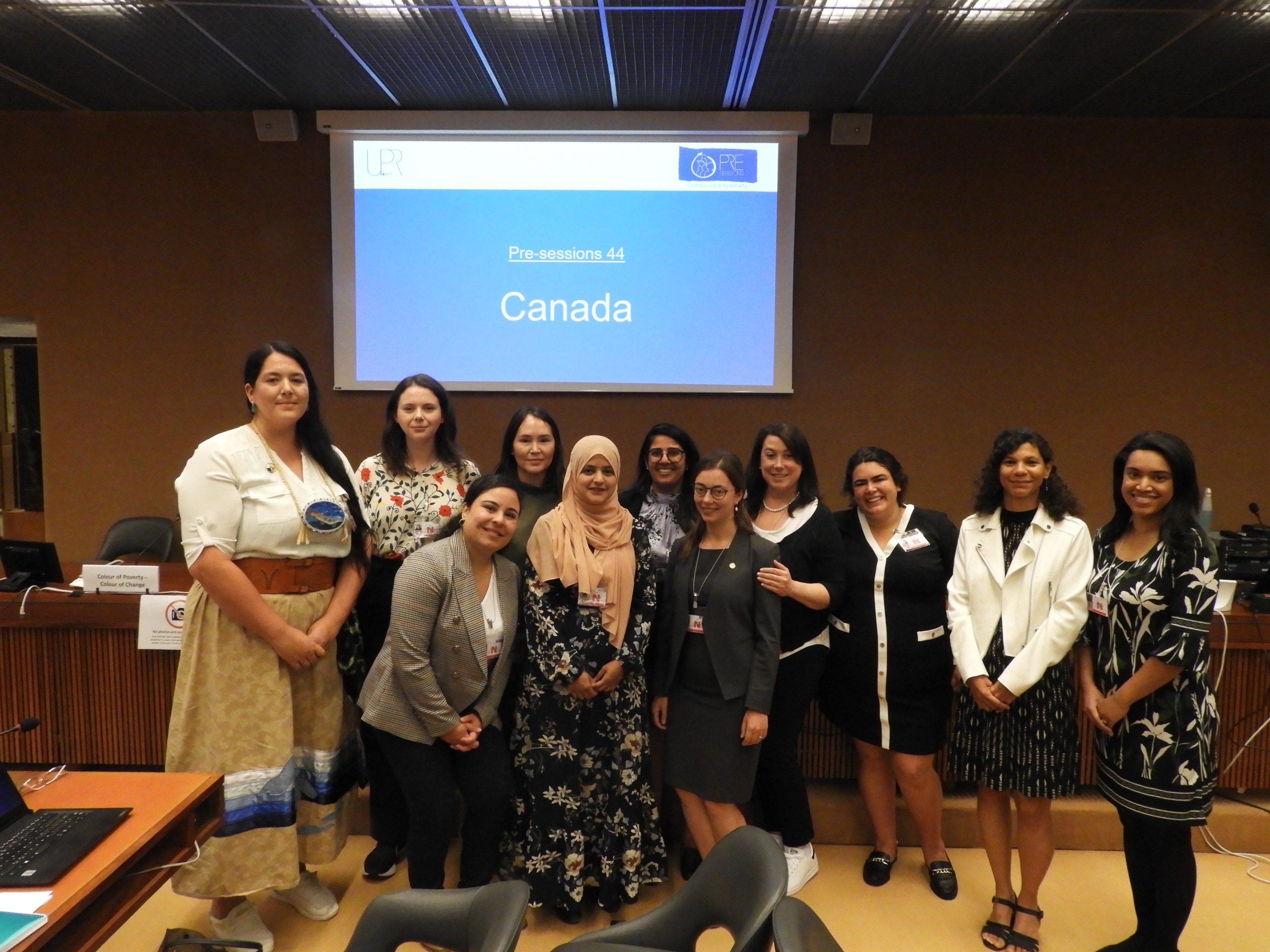 Question #5: Can you explain a little bit about the pre-session you were invited to?
Question #5: Can you explain a little bit about the pre-session you were invited to?
Civil Society organizations can’t make recommendations to Canada through the UPR directly, but they can engage in the process by submitting a written report or engaging with diplomats from other countries to make sure that they make the recommendations that organizations believe will be the most effective in addressing the human rights issues in question.
If organizations make a written submission, they can be invited to join a panel of speakers from other civil society organizations at an in-person session at the United Nations in Geneva, Switzerland. This is called a “pre-session” and takes place two or three months before the actual UPR session.
Organizations that are invited to speak on the panel get to speak about their submission and present their key recommendations to representatives from different countries. While in Geneva, they can also engage with country representatives in person to explain the key issues and recommendations.
CCHR made a written submission with the NRHN and I represented both organizations in Geneva at the pre-session. The goal of myself and the other panelists from Canada was to inform representatives from other countries about what was happening on the ground in Canada to make sure that they know what to focus on during Canada’s review. We also wanted to make sure that recommendations they make to Canada are going to be effective.
A total of 6 panelists spoke on the panel for Canada, but we heard from other organizations that not all the Canadian organizations that sent written reports were invited to apply to be on the panel. This could be due to the lack of updated information at UPR-Info, the organization that organizes the UPR pre-sessions. I hope that there will be more transparency in the application process when it’s time for Canada’s next review so that more organizations can participate.
Question #6: What about other countries? Did they go under review as well? Did you meet other civil society organizational representatives from other countries?
In addition to Canada, 13 other countries were reviewed in November 2023, and each country had a panel of organizations participate in the pre-session to achieve the same goals ahead of the review. Panels could have a maximum number of 7 speakers. Some panels had fewer presenters for a variety of reasons. For example, only one panelist was able to make the long journey from Tuvalu. Some activists from Cuba were not allowed to travel due to their advocacy work and sent a video statement instead. One panelist from Bangladesh sent a colleague in his place because he was incarcerated due to his human rights advocacy work.
Question #7: How can organizations advance their advocacy aims through the UPR? And what was your personal experience with it?
Organizations can advance their advocacy aims by submitting a written report, as mentioned earlier. However, if an organization cannot attend the pre-session, they can still send their reports to country representatives directly, first to their permanent missions in Geneva and then to the embassies of the same countries in Canada, because they work together to develop their recommendations.
Organizations interested in engaging with the UPR process can also talk to the organizations that are attending the pre-session in Geneva and ask them to push for their recommendations in their advocacy with country representatives. For example, I met with other organizations in the housing rights sector before traveling to Geneva, and they provided me with their priority recommendations related to the right to housing which I then included in my meetings with representatives.
In terms of deciding which countries to target, I developed a list based on which countries prioritized the right to housing and other economic and social rights in their past recommendations to Canada and other countries. I sent outreach emails to them before going to Geneva to schedule meetings during my time there. Some countries were responsive while others were not. Some were not available in Geneva, so we had virtual meetings instead. While in Geneva I also approached country representatives who were attending the pre-session panel presentations to ask for a meeting. For some of the meetings I was joined by my fellow panelists from Canada, who worked on different human rights issues which was an effective way to collaborate on our advocacy.
In meetings with country representatives, I highlighted the top housing issues in Canada, and our recommendations for addressing them. I also emphasized the right to housing and homelessness crisis cuts across all communities and therefore has implications for the priority groups that some of the countries usually focus on in their recommendations, such as Indigenous communities and women and gender diverse people.
Response from State Representatives
The representatives I spoke with were engaged and interested and found our meetings informative as many did not know what is happening on the ground in Canada. Most of the representatives were surprised to hear that homelessness and inadequate housing presented such a human rights crisis in Canada. They were also surprised by how far Canada falls behind other developed and wealthy nations when it comes to housing. Overall, they were receptive although some said they are facing those issues themselves and would worry about being hypocritical if they make recommendations related to the right to housing.
Country representatives take organizations seriously because they need to hear from them to understand what is happening on the ground in the countries they are reviewing. That is why I would encourage organizations to engage in this process in any way that they can to advance their advocacy aims.
We have just started to see the impact of this work. Greece, who I met with while in Geneva, used one of our recommendations in Canada’s review, on revising the National Housing Strategy to align with the right to housing. This resulted in their powerful recommendation, that Canada “step up efforts to ensure the right to adequate housing and achieve clear goals for eliminating all forms of homelessness in accordance with the National Housing Strategy Act.”
In February 2024, we will hear from Canada on which recommendations they will “accept,” and how they plan to implement those recommendations. By engaging with the federal government before it finalizes its response, civil society organizations can advocate for the recommendations that should be accepted and make suggestions for how the government can implement them. Civil society can also continue to work together to monitor the government’s progress in implementing UPR recommendations (and Canada’s human rights commitment more broadly).
Overall, it was a pleasure to get to know the other organizations who spoke on the Canadian panel, whom I may not have had the opportunity to meet otherwise. It was also a tremendous pleasure to meet advocates from other countries, to hear them speak and learn about the human rights issues and priorities they wanted to bring attention to.
Question #8: Did you receive any funding or support from the Canadian government to engage with the UPR?
No there were no funding opportunities from the Canadian government for organizations to engage with the UPR. Civil society organizations have to find their own funding to participate in the pre-session. I believe that there should be government funding that supports organizations’ ability to engage and participate in the UPR process. This is something that we need to advocate for collectively as civil society organizations.
In recent years the government made a commitment to engage with civil society organizations throughout the UPR process, including before its national report is finalized. This year, the government sent some organizations a draft of their national report and asked for feedback, but it did not hold meaningful engagements. Although there are now opportunities for engagement after the review, the government made a commitment to improve engagement with civil society organizations before the review takes place, and to hold robust consultations on the key human rights issues that should be raised in their national report. Due to this ongoing gap in engagement, civil society organizations are now working together to call on the Canadian government to fulfill its commitment and develop an effective engagement plan for future UN reviews and processes that require engagement with civil society.
Question #9: What would you say are the specific impacts of the UPR on domestic policy and accountability to human rights in Canada? And how can advocates within Canada help amplify or engage with the process to make it even more effective?
Civil society organizations can use the recommendations that Canada accepts during the review process (i.e., in February of 2024) to put pressure on the government to follow through with implementation. Regarding the right to housing, organizations can meet with the Minister of Housing to discuss those specific recommendations as well as use the media to bring attention to the process and the recommendations that came out of it, to add further pressure.
Organizations can also take advantage of the timing of this review and whatever else is happening on the international stage to add pressure. For example, Canada is currently seeking a seat on the United Nations Human Rights Council, so its reputation on the world stage is important, especially when it comes to the implementation of human rights.
Coordinating Efforts Across Civil Society
The CCHR, NRHN, and other organizations that work on different issues began to meet before the UPR pre-session to discuss intersecting human rights areas that we wanted to prioritize and see addressed. This resulted in recommendations like one from Mexico, which highlighted the need to “strengthen healthcare and housing for Indigenous peoples, people of African descent, migrants, and refugees.”
This intersectional collaboration helped foster relationships and lay the foundation for future work we can do together. It is important that we continue to build on this momentum and continue to engage with and put pressure on the government to implement the recommendations that it accepts after the review.
What can also be effective in terms of advocacy is mobilizing to create a permanent group or coalition to do this type of international human rights advocacy work. That way, organizations can have a permanent structure for this kind of work that will allow them to support each other and divide the workload. Organizations can also amplify each other’s written reports and recommendations on their various platforms. As many organizations lack capacity and resources, pushing for funding to keep a coalition going around this process will be important. This will help civil society organizations hold the government accountable after every UPR cycle.
To further make the process more effective for future UPRs, I encourage more advocates and organizations to submit written reports as part of this process, which don’t have to be very long or complex, and can refer to the last recommendations made to Canada on a particular issue, how Canada did in addressing them, and what countries should ask Canada to do to improve.
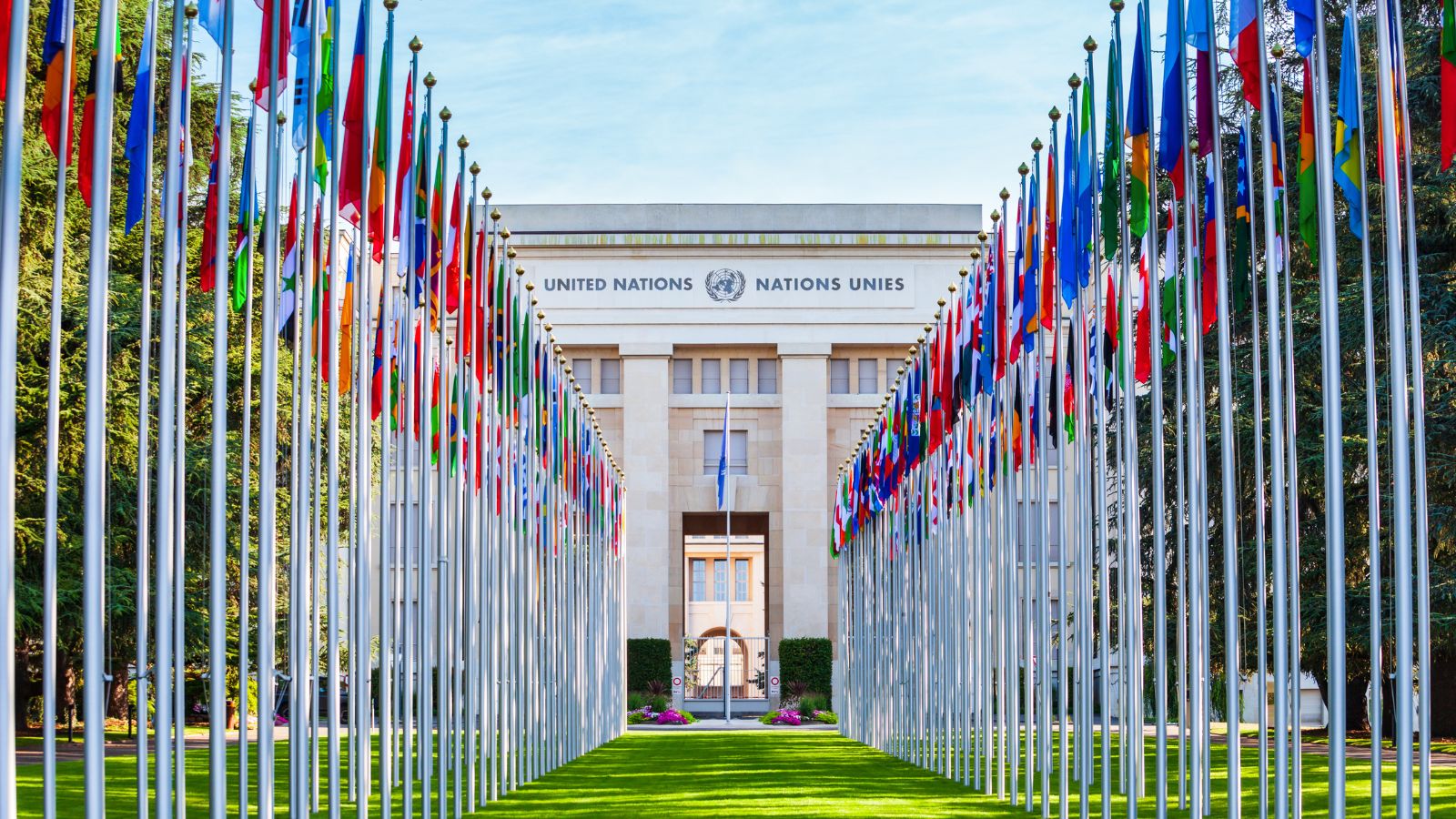 Question #10: Do you think engaging with international human rights processes like this is an effective way to make positive change domestically in Canada?
Question #10: Do you think engaging with international human rights processes like this is an effective way to make positive change domestically in Canada?
I do think that engaging with international human right processes can contribute to positive change domestically. Participating in the UPR pre-session was a great opportunity to bring other countries’ attention to the housing and homelessness crises, and to ensure that those issues are part of the dialogue during Canada’s review by other countries.
The National Housing Strategy Act is a good example of how long-term domestic advocacy and international pressure can go hand in hand to achieve long-term change. In fact, one of the recommendations Canada received from Germany during this review included “addressing the issue of homelessness through tangible goals and timelines, especially regarding marginalized groups,” which is a key component of the NHSA.
We do face a challenge in Canada since processes like the UPR aren’t taken as seriously as they are in other countries, but I do still believe that they can play an important role in supporting domestic advocacy. One problem is that Canada currently has no solid plan for the implementation of human rights commitments that was co-designed with civil society organizations and lived experts. Civil society organizations are currently working to call on the federal government to develop such an implementation plan.
I also believe that it is important for organizations in Canada to participate in these international spaces because they can draw the world’s attention to the most pressing issues. For example, many of the country representatives I spoke had no idea that homelessness and inadequate housing form one of the major human rights crises that Canada is facing. CCHR and NRHN were the only organizations that focused on the right to housing and brought that issue to the forefront. Participating in the pre-session in Geneva was therefore an opportunity to learn about how other countries perceive Canada and bring these issues to their attention.
A follow-up blog will be released in early 2024 to dive deeper into the right to housing recommendations Canada received from member states as mentioned above, which of the recommendations Canada chooses to accept, and what their decision means for the right to housing movement.
Additional Readings & Resources
- Canadian Centre for Housing Rights and National Right to Housing Network: Joint submission to Canada’s 4th Universal Periodic Review
- Maytree: Are our governments ready to get serious about human rights?
- CTV News: Canada a beacon for others but must keep its promises: UN human-rights chief


